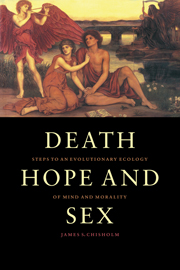1 - Evolution and explanation
Published online by Cambridge University Press: 02 December 2009
Summary
Empty is that philosopher's argument by which no human suffering is therapeutically treated. For just as there is no use in a medical art that does not cast out the sicknesses of bodies, so too there is no use in philosophy, unless it casts out the suffering of the soul.
Epicurus (341–271 BCE)Explanation is not achieved by description of the patterns of regularity, no matter how meticulous and adequate, nor by replacing this description by other abstractions congruent with it, but by exhibiting what makes the pattern, i.e., certain processes.
Fredrik Barth (1966:2)All organisms are all of the time problem-solving.
Karl Popper (1994:55)Clarity about what it means to be human constitutes not only the highest political and therapeutic vision, but also the height of practical reason. This is because it is from conceptions of human nature that access to all social resources flows. Aristotle argued that humans become aware of their political ideals only through their understanding of shared human nature. Taking his lead, Epicurus and the Hellenistic philosophers developed the idea that both philosophy (knowledge) and politics were medicine (i.e., healing, therapy) carried on by other means (Nussbaum 1994). At some point, everything human has philosophical and political implications, but, as Western philosophers have known at least since Aristotle, in order even to see these implications it is necessary first to have knowledge of human nature – otherwise, what would the implications be for? For Aristotle and the Hellenistic philosophers, knowledge of human nature could only lead to eudaimonia – i.e., “human flourishing.”
- Type
- Chapter
- Information
- Death, Hope and SexSteps to an Evolutionary Ecology of Mind and Morality, pp. 1 - 27Publisher: Cambridge University PressPrint publication year: 1999



